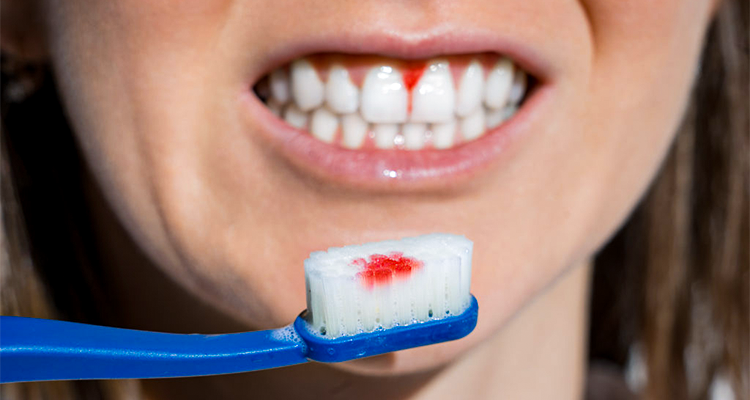In This Article
Why Do My Gums Bleed When I Brush My Teeth
May 05, 2023

Have you ever brushed your teeth and noticed your gums bleeding? It can be a concerning and uncomfortable experience.
Do you think in your heart: Why do my gums bleed when I brush my teeth?
There are numerous causes of bleeding gums, ranging from poor oral hygiene to underlying medical conditions.
Understanding the reasons behind your bleeding gums is crucial to finding an effective solution.
In this article, we'll explore the common causes of bleeding gums and provide practical tips on how to prevent and treat this issue. Whether you've been dealing with bleeding gums for a while or it's a new problem, this guide will provide valuable insights on how to keep your gums healthy and strong.
Article Directory:
- Why Do My Gums Bleed When I Brush My Teeth
- Common Causes of Bleeding Gums
- Bleeding Gums and Physical Illness
- What You Can Do to Stop Bleeding Gums
- Summarize
Why Do My Gums Bleed When I Brush My Teeth
Have you ever experienced bleeding gums while brushing your teeth and wondered why? There are several reasons why your gums may bleed. Gum disease is a common cause, and plaque and tartar buildup on your teeth is one of the main causes. This can lead to inflammation and bleeding of the gums.
Another possible cause is using a toothbrush with hard bristles, which can irritate and damage the gums. Brushing too hard can also cause bleeding gums.
What are gingivitis and periodontal disease? How are they related to bleeding gums?
The buildup of plaque and tartar on your teeth is what causes gingivitis, the mildest form of gum disease. Plaque is a sticky film of bacteria that forms on your teeth and gums and, if not removed, can cause inflammation and bleeding of the gums. Symptoms of gingivitis include red, swollen, and bleeding gums.
If left untreated, gingivitis can progress to periodontal disease, which is a more serious form of gum disease. Periodontal disease is characterized by the destruction of the bone and tissues that support your teeth, which can lead to tooth loss. In addition to bleeding gums, other symptoms of periodontal disease include receding gums, bad breath, and loose teeth.
Bleeding gums can be a cause for concern, and it's important to know what they might mean.
In most cases, bleeding gums can be a sign of an underlying oral hygiene problem or a problem with your daily oral care. This could include using an improper water flosser, using a hard-bristled toothbrush, or brushing too hard.
However, there may be other causes of gum bleeding that require further investigation.
Common Causes of Bleeding Gums
Bleeding gums are often a sign of gum disease, which is a prevalent issue among adults. According to the Centers for Disease Control and Prevention (CDC), 47% of adults aged 30 and over and 64% of those over 65 are affected by some form of gum disease. As a result, bleeding gums are the most common indicator of gum disease. Given the high prevalence of gum disease, bleeding gums are a common occurrence among many individuals.
However, there are several common causes of gum bleeding when you brush your teeth. Here are the top 15 causes of bleeding gums:
- gingivitis
- periodontal disease
- brush too hard
- use a hard toothbrush
- Hormonal changes (such as during pregnancy or menopause)
- vitamin deficiencies (such as vitamin C)
- leukemia or other blood disorders
- diabetes
- certain medicines (such as blood thinners)
- smoking or using tobacco
- gum infection
- poor oral hygiene
- mouth ulcers
- chewing tobacco
- alcohol abuse
Bleeding gums may indicate that you need to improve your oral care routine by brushing and flossing more regularly and effectively. Gingivitis is a common cause of bleeding gums, which can be addressed by consulting your dentist for proper dental care and hygiene restoration. Additionally, improper brushing or flossing techniques can also lead to bleeding gums.
In such cases, your dentist can guide you on the correct usage of water flossers and brushing techniques to prevent gum damage while ensuring optimal oral hygiene.
Bleeding Gums and Physical Illness
Sometimes, even after you've seen your dentist and brushed carefully as directed, you may still ask, "Why do my gums bleed when I brush?" What could be causing the bleeding and causing further long-term damage to my teeth?
At that time, it is important to go to the hospital for a physical examination to find out. While gum disease is often the cause of bleeding gums, bleeding gums can also be a symptom associated with many different diseases and health problems.
If your teeth and gums are healthy, but your gums still bleed when you brush your teeth, get a thorough physical exam to determine the underlying cause.
- Leukemia: cancer of the blood and bone marrow that can cause bleeding gums. Cancer cells interfere with the body's ability to clot blood, causing bleeding.
- Diabetes: High blood sugar can cause inflammation and damage to blood vessels, including those in the gums. This can make them bleed more easily.
- Vitamin deficiencies: Deficiencies in vitamins such as vitamin C and vitamin K can affect gum health and increase the risk of bleeding.
- Oral cancer: In rare cases, bleeding gums may be a symptom of oral cancer.
- Von Willebrand disease: This is a genetic bleeding disorder that affects the blood's ability to clot properly. People with this condition may experience bleeding gums as well as nosebleeds, heavy menstrual periods, and easy bruising.
- Scurvy: Scurvy is a rare disease caused by a severe vitamin C deficiency. It can lead to bleeding gums as well as other symptoms such as fatigue, joint pain, and a skin rash.
Don't worry; see your doctor right away if the bleeding persists.
In addition, there are some ways you can try to prevent bleeding gums when you brush your teeth.
What You Can Do to Stop Bleeding Gums
Here are some practical tips and ways to help stop bleeding gums:
- Improve your oral hygiene: Make sure you brush your teeth twice a day with a soft-bristled toothbrush and fluoride toothpaste, and floss at least once a day to remove plaque and food debris that can cause gum irritation and bleeding.
- Use an antiseptic mouthwash: Rinse your mouth with an antiseptic mouthwash after brushing and flossing to kill bacteria and reduce inflammation.
- Change your toothbrush: If your toothbrush bristles are frayed or worn out, it can cause irritation and bleeding. Replace your toothbrush every three to four months or sooner if the bristles become worn. Use an electric toothbrush if you can.
- Use a gum massage technique: Gently massage your gums with your fingers in a circular motion to improve blood circulation and reduce inflammation.
- Improve your diet: Eat a balanced diet rich in vitamins and minerals, especially vitamin C, which helps to strengthen blood vessels and reduce inflammation.
- Quit smoking: Smoking is a major risk factor for gum disease and can worsen bleeding gums.
- Visit your dentist regularly: Regular dental check-ups and cleanings can help prevent and treat gum disease, and your dentist can give you tips on how to improve your oral hygiene.
If the bleeding persists or other symptoms appear, always consult your dentist or doctor.
Summarize
In conclusion, bleeding gums when brushing teeth should not be ignored, as it may be a sign of an underlying dental or health problem. Maintaining proper oral hygiene practices such as regular brushing, flossing, and using an antiseptic mouthwash can prevent gum disease and bleeding gums. However, if the bleeding persists, it is important to consult a dentist to identify and treat any potential dental issues. By taking care of your oral health, you can prevent bleeding gums and keep your teeth and gums healthy for years to come.
Share this article














